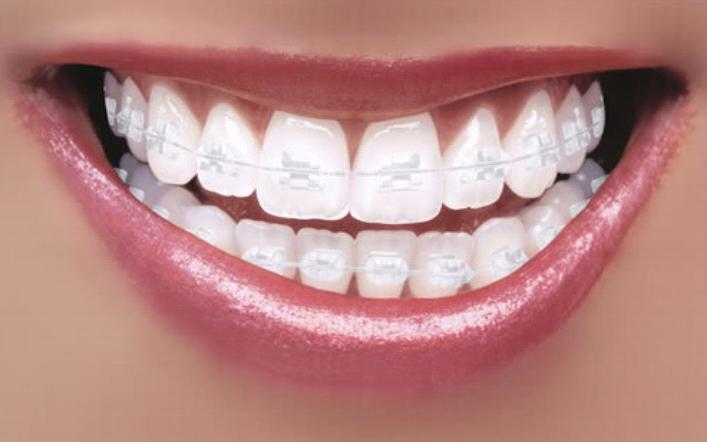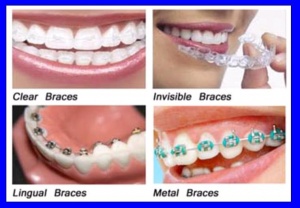 Chances are slim to none that your teeth are 100% perfect. If you made it through the childhood years and sports activities and managed not to chip, otherwise damage or lose a tooth or two along the way, please consider yourself lucky. The teeth you offered the Tooth Fairy in exchange for loose change do not count – we are talking about your permanent teeth.
Chances are slim to none that your teeth are 100% perfect. If you made it through the childhood years and sports activities and managed not to chip, otherwise damage or lose a tooth or two along the way, please consider yourself lucky. The teeth you offered the Tooth Fairy in exchange for loose change do not count – we are talking about your permanent teeth.
Regular visits to the dentist help to maintain good dental hygiene and regular check-ups by the dentist and visits to your dental hygienist will keep your teeth healthy and strong and plaque free. You might have been lucky enough to have a stellar smile without the need of braces, but, did you know that once your pesky wisdom teeth decide to put in an appearance, that their emergence can wreak havoc with that beautiful smile? Well more about wisdom teeth later.
The benefits of braces
The baby teeth need to be healthy but a little misalignment is okay – they are not the forever teeth after all. But, once your permanent teeth come in, if they are crooked or misaligned, your dentist will probably have a heart-to-heart with you about the benefit of braces.
Braces correct your teeth, thus enhancing your image, but correctly aligned teeth are beneficial to your “orofacial” appearance as well. This term means that an orthodontic regimen will correct crowded or crooked teeth, overbites or under bites, incorrect jaw position and other jaw disorders, which, left untreated, may result in problems later in life like tooth decay, gum disease, headaches and earaches (symptoms associated with tempo mandibular joint issues, a/k/a TMJ) as well as speaking, biting or chewing problems. It also might relieve the PAIN we usually associate with dental procedures.
Yes, braces can correct any and all of these issues, thus being proactive will eliminate the many dental problems that will plague you later in life. Your dentist will also tell you that ensuring a proper alignment of the teeth and jaw now will help you to eliminate the use of a partial plate or dentures down the road. If you want to discuss braces with a top dentist you should schedule a consultation with a top dentist in New Jersey ASAP! Top dentists in NJ are experts at cosmetic dentistry and can go over all of the benefits of braces with you.
The best time to traverse through the braces regimen is when you are between age ten and fourteen while the head and mouth are still growing and teeth are more accessible to straightening. But, if you are older adult, don’t despair – it is never too late to correct minor or major misalignment of your teeth – it might just take a little longer, that’s all.
How do braces realign teeth
Your dentist is most familiar with your teeth, and, for more severe alignment issues, such as severe malocclusions, or “bad bites”, you might be referred to an orthodontist, whose specialty is solely focused on the alignment of your teeth and jaws using non-surgical procedures. Though many dentists complete additional coursework and offer orthodontic services, your own dentist will be able to evaluate your need for braces and perform any teeth extractions necessary before the braces are fitted. In some cases, like impacted wisdom teeth, your dentist may even refer you to an oral and maxillofacial surgeon for the extraction. Your dentist will evaluate your needs and prescribe a regimen for you based on his expertise and skill set and make the appropriate referrals.
Types of braces

Your dentist and orthodontist will decide on the suggested course of treatment based on the severity of your case. There are several types of braces: brackets, metal and ceramic or plastic, that are bonded to teeth. Ceramic brackets are typically clear or tooth-colored and are far less noticeable than metal brackets. In some cases, lingual, or concealed braces are brackets that are affixed to the back of teeth, hidden from view. Many adults opt for this type of braces. Either type of braces will use wires to move the teeth gradually to their desired position.
The newer alternative to traditional braces is a series of clear, customized, removable appliances called aligners. The unique aspect of these braces is they are removable, enabling the wearer to remove it thus eliminating food and plaque to accumulate in and around the appliance. These are also tailored to adults with minor spacing problem, rather than adolescents whose teeth are still shifting as the permanent teeth come in.
Wisdom teeth won’t make you wise
If your wisdom teeth decide to put in an appearance, either before a regimen of braces, or afterward, you should make an appointment to see your dentist as quickly as possible. You should liken wisdom teeth to weeds in your garden … weeds push their ugly heads through the dirt pushing aside the beautiful flowers in the process, and, likewise wisdom teeth are problematic as they can crowd your other teeth causing misalignment. In some cases, if the wisdom teeth are straight, strong and healthy, the dentist will recommend that you have your rear molars removed and let the wisdom teeth replace them.
In other cases, impacted wisdom teeth may become infected and you risk damaging your other teeth and/or gums without proper medical attention. You should see your dentist at once if you experience any of the following symptoms with a tooth (or teeth) that are located behind your last molar as it may signal a wisdom tooth/teeth dental crisis:
- Red or swollen gums
- Tender or bleeding gums
- Jaw pain
- Swelling around the jaw
- Bad breath
- An unpleasant taste in your mouth
- Difficulty opening your mouth
The topic of wisdom teeth and braces must be mentioned because, as mentioned above, the appearance of wisdom teeth may cause misalignment in your teeth which may require you to wear braces to correct the issue. The appearance of wisdom teeth usually occurs between the ages of 17 and 21. It is important to note that you might have been through the braces regimen and are not in the retainer phase, but the quick emergence of wisdom teeth can quickly undo any good work that your orthodontist did to get your teeth perfectly aligned. Thus, you, your dentist and hygienist should be on the lookout for them.


